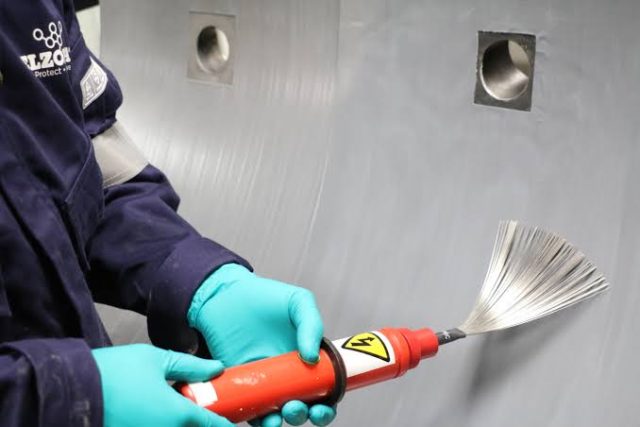SPECIALIZED SERVICES
- HARDNESS TESTING
- HEAT TREATMENT
- PRESSURE TESTING
- FLOWRATE MEASUREMENTS.
- HOLIDAY TESTING
- LEAK TEST:
- LIFTING EQUIPMENT INSPECTION
- VACUUM TESTING.
HARDNESS TESTING

Hardness testing is a key element in many quality control procedures .hardness testing is ‘a test to determine the resistance a material exhibits to permanent deformation by penetration of another harder material.’ However, hardness is not a fundamental property of a material. Therefore, when drawing conclusions of a hardness test, you should always evaluate the quantitative value in relation to:
The given load on the indenter
A specific loading time profile and a specific load duration. PTI have well trained and experience personnel for Hardness Testing
HEAT TREATMENT
During production welding, heat treatment may be required to relief stress with the overall aim of removing residual stresses that may have been generated during welding. Stress relieving generally aids in the removal of or reduction of the risk of brittle fracture after welding as well as stress corrosion, among other metallurgical problems associated with welding.
These thermal treatments therefore assist in assuring weld quality, performance and integrity. PTI has experience personnel and Heat Treatment Machines to serve this purpose specific indenter geometry
PRESSURE TESTING

Prime-Top Inspection Ltd have well trained and experience personnel to carry out pressure testing Services. Pressure testing is the final test stage prior to the commissioning or reinstatement of a system.
Individual skids, complete modular system, valves, spools, or pipeline can be pressure tested. This final proof testing is normally performed above the design pressure of the system, and various test mediums are employed including liquid and gas
FLOWRATE MEASUREMENTS.
Flow rate is the volume of fluid that passes through a given cross-sectional area per unit time. Accurate flow rate measurement using an appropriate flow meter is paramount to ensuring fluid control processes run smoothly, safely and cost-effectively. Flow rate measurement is an essential parameter in many applications. Whether you are measuring gas or liquid, it is vitally important to ascertain that the right fluid is going to the right place at the right time. Flow rate measurement is especially important in applications requiring stringent quality control, such as batch control or time-pressure dosing processes in the pharmaceutical industry
HOLIDAY TESTING

A holiday test is an inspection method used to detect discontinuities in painted/coated surfaces using specialized tools and equipment. These tools, called holiday detectors, are portable devices that are swept across the coated surface.
Holidays tests work on the concept of electrical conductivity. Metal substrates are excellent conductors of electricity, and therefore allow current to flow through them. On the other hand, many coatings are poor conductors of electricity and resist the flow of electricity. Using this principle, holiday tests use instruments to locate flaws in anticorrosive paints and coatings.
A holiday test is also known as a continuity test.a holiday is a general term for various types of coating discontinuities, such as:
Runs and sags
Cissing
Cratering
Pinholes
Undercoating
These defects affect the coating’s thickness, thus revealing enough of the underlying metal to complete the circuit between the electrode and the grounding wire
LEAK TEST

Leak testing is a procedure that inspectors use to determine whether an object or system is functioning within a specific leak limit.
Leaks occur when there is a defect—a hole, crack, or some other kind of flaw—in an object, allowing whatever the liquid or gas it is holding to flow out. Leak testing uses pressure to find these defects so that they can be addressed as part of regular maintenance procedures.
In general, leak tests are performed on objects that are used to store or move liquids or gases. Leak testing is one of the most commonly used inspection methods. It falls into the category of non-destructive testing (NDT) methods because inspectors can perform it without permanently altering or damaging the object they’re inspecting.
LIFTING EQUIPMENT INSPECTION

Safe operating practices call for care and vigilance when operating heavy lift and heavy pulling equipment. Cranes, hoists, slings and shackles all require regular inspection and certification to ensure the equipment in use meets the minimum requirements and standards for the industry. Personnel who operate the equipment also need proper training to ensure they understand the importance of safe operating practices.
PRIME-TOP INSPECTION have well trained and certified inspector to carry out Thorough Examinations and inspections on your lifting equipment to ensure that it is fit for use in accordance with British Standards, or other International Standards of your choice. We also have a comprehensive and consistent platform for the reporting of inspection activities undertaken, and the presentation of subsequent reports and data to PTI clients in digital form within a database structure.
VACUUM TESTING.

PTI provides you with well-trained Inspectors for vacuum testing. The objective of the vacuum box technique is to locate leaks in a pressure boundary that cannot be directly pressurized. This is accomplished by applying a soapy solution to a local area of the pressure boundary surface and creating a differential pressure across that local area of the boundary. If a defect is present in the test area, the formation of bubbles (caused by gas passing through the solution) will indicate the location of potential leakage. This method is one of the most widely applied test methods to detect leakage and defects and is widely used in testing the plating (specifically the welds) of tanks and ships.
